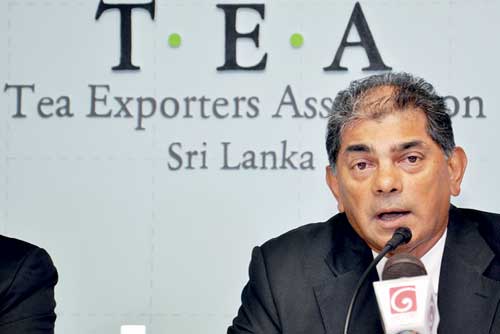Saturday Feb 21, 2026
Saturday Feb 21, 2026
Saturday, 29 October 2016 00:01 - - {{hitsCtrl.values.hits}}
By Chathuri Dissanayake 
Great expectations continued for Budget 2017 with tea exporters being the latest to add their wish list, requesting for tax concessions and renewing calls to carry forward a previous proposal to establish a tea blending hub in Sri Lanka.
Speaking at a press conference held yesterday ahead of the Annual General Meeting of the body, Tea Exporters Association (T. E. A.) outgoing Chairman Rohan Fernando claimed they are the highest taxed export commodity in the country.
Drawing on pre-budget discussions, Fernando said Finance Ministry officials were “surprised” at the high level of taxes the tea exporters pay, and agreed to include concessions in the upcoming Budget.
“Tax paid by tea exporters is the highest for any export. There are four different taxes to be paid. I am not sure if these taxes just stacked up over the years, but officials were surprised. For one export commodity, there are two CESS levies, promotional and a marketing levy, and EDB tax, plus we have to pay separate fees to the Department of Commerce, licence fees and global taxes as well. This is an export trade; usually they are not taxed heavily,” he said.
The association had also dusted off discussions on liberalising the tea sector to allow tea imports for the purpose of blending for re-export and insisted it was an essential policy if the industry is to move forward and gain a bigger market share in the global market.
Highlighting the need to be present in the ‘middle and bottom shelves’ in the global tea market, Fernando explained that currently Sri Lanka only has a global market share of about 6%.
“The global demand at present is 1.8 billion kilogrammes annually. But Sri Lanka only produces 350 million kilogrammes. For tea there are a few limitation factors such as declining volumes and quality of tea as well as exorbitant pricing for even poor quality teas through state intervened controls on imports. For the tea export industry to grow and take a substantial share of the global market, these shackle like impediments must be removed,” he explained.
Fernando backed liberal trade policies and stressed that it was the only growth path for the industry.
Dismissing concerns regarding the quality of tea under the Ceylon Tea brand, Fernando said that the local industry actors are not in control of the produce once it leaves the auction even at present. Market segments which have been allowed to import and export value added tea products, such as green tea has developed well over the years, which should alleviate concerns about a tea hub.
Production slowed down this year and with an estimated export volume of 280million kilogrammes with an estimated revenue of USD 1.3 billion, the industry has experienced a drop in terms of both revenue and volume, he noted. The drop was attributed to the reduction in the tea crop due to drought, restriction on the use of fertiliser as a result of cut-backs in the government subsidy and banning of weedicide. While global production has grown by 14% excluding green tea production, Sri Lankan production by contrast has only recorded a 5% expansion. Stagnation of production in Sri Lanka continues due to low productivity, inadequate re-planting, said Fernando, calling on the Government to take a conscious decision to salvage the industry.